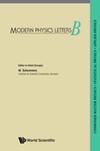Dynamics and dispersion of inertial particles in circular cylinder wake flows: A two-way coupled Eulerian–Lagrangian approach
IF 1.8
4区 物理与天体物理
Q3 PHYSICS, APPLIED
引用次数: 0
Abstract
In this paper, the motion of inertial particles in three-dimensional (3D) unsteady cylindrical wake flow is investigated by a two-way coupled Eulerian–Lagrangian approach. At different flow Reynolds numbers (Re), the corresponding striking dynamic property and dispersion mechanism of four particle classes have been studied, with inertia parameterized by means of Stokes number (Sk). It is found that inertial particles with lower Stokes number are expelled from vortex cores, and coherent voids encompass the local Kármán vortex cells. As Stokes number increases, a low velocity particle channel could be formed, which almost coincides with the results in the literature. Moreover, with the increase of Reynolds number, numerous irregular coherent voids are observed in the cylinder wake, and the high-speed particles follow the fluid flow closely when they are contained in the vortices. Although the centrifugal force of Kármán vortex cells significantly affects the dynamics of inertial particles, the fluid flow modulation is believed to be responsible for the distinctive particle dispersion patterns in the vortex streets. For particles with medium inertia, the two-way coupled modulation weakens the centrifugal effect of vortex structures on the particles. This trend declines with the increase of Reynolds number, and vanishes with light particles, while both two-way coupled modulation and the centrifugal effect of vortex structures are almost equally effective with heavy particles. The investigations contribute to a better understanding of the particle-laden flows in practical applications, which will benefit the optimized design of certain machinery and equipment for the industry.圆筒形尾流中惯性粒子的动力学和分散:欧拉-拉格朗日双向耦合方法
本文采用欧拉-拉格朗日双向耦合方法研究了惯性粒子在三维(3D)非稳态圆柱形尾流中的运动。在不同的流动雷诺数(Re)条件下,研究了四类粒子相应的撞击动态特性和分散机制,惯性参数采用斯托克斯数(Sk)。研究发现,斯托克斯数较低的惯性粒子会被驱逐出涡旋核心,而相干空隙会包围局部的卡尔曼涡旋单元。随着斯托克斯数的增加,低速粒子通道可能会形成,这与文献中的结果几乎一致。此外,随着雷诺数的增加,在气缸尾流中观察到大量不规则的相干空洞,高速粒子被包含在旋涡中时紧紧跟随流体流动。虽然卡尔曼涡旋室的离心力对惯性粒子的动力学有很大影响,但流体流动调制被认为是涡街中粒子分散模式独特的原因。对于具有中等惯性的粒子,双向耦合调制削弱了涡流结构对粒子的离心效应。这种趋势随着雷诺数的增加而减弱,在轻质颗粒中消失,而在重质颗粒中,双向耦合调制和涡旋结构的离心效应几乎同样有效。这些研究有助于更好地理解实际应用中的颗粒载流,这将有利于某些工业机械和设备的优化设计。
本文章由计算机程序翻译,如有差异,请以英文原文为准。
求助全文
约1分钟内获得全文
求助全文
来源期刊

Modern Physics Letters B
物理-物理:凝聚态物理
CiteScore
3.70
自引率
10.50%
发文量
235
审稿时长
5.9 months
期刊介绍:
MPLB opens a channel for the fast circulation of important and useful research findings in Condensed Matter Physics, Statistical Physics, as well as Atomic, Molecular and Optical Physics. A strong emphasis is placed on topics of current interest, such as cold atoms and molecules, new topological materials and phases, and novel low-dimensional materials. The journal also contains a Brief Reviews section with the purpose of publishing short reports on the latest experimental findings and urgent new theoretical developments.
 求助内容:
求助内容: 应助结果提醒方式:
应助结果提醒方式:


